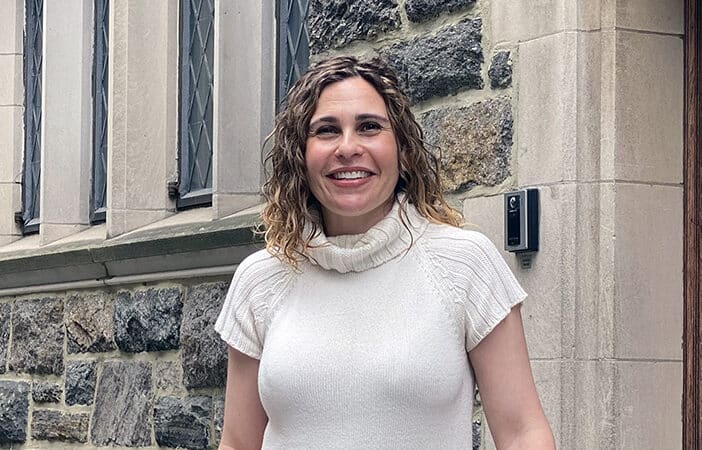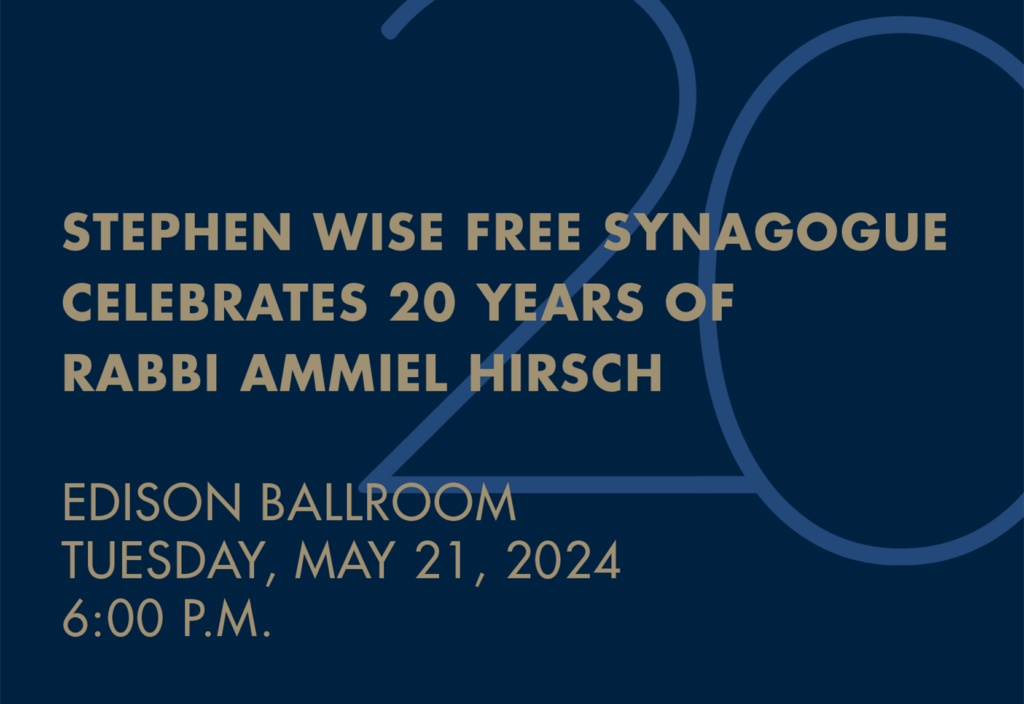
Stephen Wise Free Synagogue is proud to announce the establishment of the Marilyn G. and Joseph B. Schwartz Israel Fellowship to pioneer an education and advocacy program aimed at healing the fractured relationship between American liberal Jews and Israel. We are grateful to Marilyn and Joe for their vision and generosity.
Rabbi Tracy J. Kaplowitz has joined us as our inaugural fellow. She comes to Stephen Wise from JWB Jewish Chaplains Council, which ensures the quality of Jewish life for Jews in the U.S. military and the Veterans Administration. An experienced spiritual leader and educator, she served as a reserve chaplain in the U.S. Air Force and on the professional staff of both the Schechter School of Long Island and the Jewish Education Project. Rabbi Kaplowitz was ordained at the Jewish Theological Seminary of America and earned her doctorate in the sociology of education from the Hebrew University of Jerusalem.
We sat down with Rabbi Tracy to get to know her a little better.
Q: Where did you grow up?
A: I grew up in Union, New Jersey, where my parents still live. I started at Green Lane Y’s nursery school, then attended Solomon Schechter Day School of Essex and Union, and spent my summers at Camp Ramah in the Berkshires. My family belonged to the local synagogue, Congregation Beth Shalom, where my dad was president. Before he retired, he was a professor of social psychology at Kean University and he founded their Human Rights Institute. And my mom is a registered dietitian.
Q: What connects you to Israel?
A: My first visit to Israel was before I began first grade. My parents wanted to ensure that I could connect what I was learning about and celebrating in school with firsthand, real-world experience. One cute memory from that trip is how I had my first taste of soda in Israel. To save money on bottled water, my parents had bought these awful metal army canteens that we were lugging all over the place with us. They were rancid. When we climbed Masada, my brother and I decided to protest by refusing to drink. My parents gave in and from that point on we were drinking Kinley Lemon-Lime, Grapefruit, and Grape sodas. In retrospect, that gave my palate a sweet taste for Israel.
I managed to return to Israel in fifth grade and then every year between ninth grade and my first year in college, including for a semester in Israel during my senior year of high school, and then again for my junior year of college. I also went back for my third year of rabbinical school, along with the Melton Senior Educators Program at Hebrew University. Midway through that year, I was invited to stay for a Ph.D. at Hebrew U., and my one-year stay turned into three years.
What connects me to Israel is a shared history with the People of Israel, going back to the time of our forefather Abraham. From that shared history comes a shared language, shared holidays, shared values, and some shared culture. And my passion for Zionism allows me to have a love affair with Israel of today. I’m amazed by the accomplishments of a country that is younger than my parents. I love the rebirth of the Hebrew language — and to hear it spoken from the mouths of immigrants from throughout the world. I have witnessed persecuted Jews find a home in Israel when no one else opened doors to them. While I see Israel’s flaws and failings, I am consistently inspired by and supportive of the activists who ensure that bad policies will not be unchallenged.
Q: Why is Israel education so critical, especially in these times?
A: There are so many people out there who will educate our youth about Israel. Yet, they often do so with a bias demonizing Israel. It is important that we ensure that Israel education comes from reliable sources.
It’s impossible to go to college today without encountering Israel Apartheid Week. We do a tremendous disservice to our youth by sending them off to college without an understanding of Israel’s history and its role as a democracy in the Middle East. I don’t believe that our youth have an obligation to counter events like Israel Apartheid Week, but I do believe they need to have a foundational understanding of Israel — and ideally to have been to the country themselves — so that their Zionism and connection to Judaism aren’t shaken.
Q: What excites you most about joining the Stephen Wise community?
A: I’ve known Stephen Wise Free Synagogue for a long time. I used to volunteer at the homeless shelter starting in 1994, when I was a student at Barnard and JTS. But Stephen Wise was a very different place in the 90s.
Today’s SWFS is a dynamic and engaged community. The professional and lay leadership are outstanding and visionary. As a community, Stephen Wise reflects the very best of the Upper West Side: a commitment to liberalism, a passion for intellectualism and culture, and a vision for a better world.
Q: What does your new role entail?
A: This is a brand-new position, so my role will develop and change as I dig into the work. Broadly speaking, I hope to help further establish Stephen Wise Free Synagogue as a beacon for Jewish peoplehood and Zionism, while combatting antisemitism and anti-Zionism.
By developing curricula, I’ll help our community — and liberal Jews everywhere — learn the language that enables them to align their liberal values with their Jewish values and support of Israel. And through advocacy and outreach, I’ll work to ensure that the next generation of leaders recognize that their support of Israel is an essential responsibility.
Rabbi Kaplowitz entered her new role today, May 16. She looks forward to meeting many of you tomorrow at our Spring Benefit celebration! But if you can’t make it tomorrow, come to services soon or drop by the synagogue!


